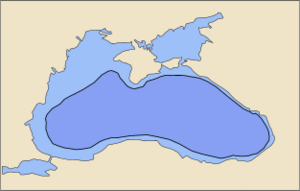Firstly, a big shout to big up my good friend Doug's
blog - if you want the lowdown on badgers and thoughts on various other random matters (including, in the latest post, being sexually assaulted by your own newsagent - the mind boggles) then give it a go.
We were having a full and frank exchange of views the other night about evolution and Darwinism in general and Richard Dawkins in particular (see Doug's post on the subject
here). Doug and I agree on a wide variety of topics, but I can't overstate how much we disagree on this one.
Let's tackle the business about the "theory" of evolution first. Scientists, contrary to what some people would have you think, are inherently cautious people. Unless they can actually prove something by observing it happening they're unwilling to trumpet it as a "fact". Now, evolution, by its very nature, is unobservable unless you've got a time-lapse camera that works over 50 million years or so. That would be great - hey, that monkey just turned into a bloke in a suit! - but sadly life isn't like that.
Science is about observing, with no preconceptions, the world around you and the things in it and trying to come up with an explanation that best fits the observed facts. Other "theories" which can't be conclusively proved, in that we don't have video footage of them actually happening, include gravity, relativity, the dinosaurs, etc. The point is the word "theory" has an entirely different meaning within the scientific community than it does outside, and indiscriminate use of it in the context of evolution spreads the illusion that there is some disagreement within the scientific community about it, when in fact there is none. Science graduates having essentially sterile semantic arguments about what "theory" and "fact" mean provide a chink in the armour which the creationists and the intelligent design-ists (not to suggest for a moment that these two groups are not
exactly the same people espousing
exactly the same views) will be more than happy to try and drive a crowbar into. This is how the absurd and poisonous "teach the controversy"
argument came about. Creationism and "intelligent design"
do have a place in schools, and it is in Religious Education lessons, along with the exploits of Ganesh the elephant god and any other legends regarding the world being sneezed out by a goat. They have
no place in science lessons, and it does a great disservice both to the science pioneers who fought and died for the cause of reason and rationality
and to the children in the education system to suggest otherwise. I don't have any children, but if I did, and I discovered that they were spending time in their science lessons being told that maybe fossils were planted by God to test the strength of our faith, I'd be sorely tempted to firebomb the school.
I wonder if we've become too complacent about the acceptance of science, rationality, etc. in the world. It seems to me, and this may just be paranoia, that we've reached the end of a long upward slope of progress through Euclid, Copernicus, Galileo, Newton, Darwin, Einstein etc. etc. to the sunlit uplands of reason and enlightenment that we currently occupy, but I think we underestimate how fragile this is. In particular, there seems to be a retreat from rationality going on at the moment. Look at astrology, homeopathy, all various other forms of "alternative" medicine, crystals, mysticism etc. It's almost as if we've become too timid, or too infected with a kind of lily-livered intellectual relativism, to dismiss this stuff as the specious pseudoscientific (at best) nonsense it undoubtedly is. If Copernicus had said "well,
I think the world goes around the sun, but I understand that conflicts with your religious views, and the last thing I want to do is cause offence - so I'll be off home now", he wouldn't have got very far. Science and the pursuit of knowledge is a harsh and unforgiving business, and a lot of people fall by the wayside, and no doubt they're none too happy about it. Well, tough. That's the price you pay for being wrong.



































